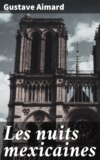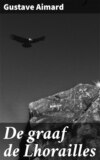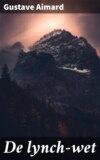Kitabı oku: «The Red River Half-Breed: A Tale of the Wild North-West», sayfa 5
CHAPTER IX
THE RED RIVER HALF-BREEDS
Whilst Ranald and Filditch reposed, the more restless trappers went out reconnoitring all the day.
There was a rising wind, which boomed in the hollows, rattled the loose stones, and soughed among the ice coated boughs.
Their first find was the lodgement of the Crow Indians. For over twenty hours these had remained in a fireless camp in a gulch eastward, living on "cold bites," so as not to betray themselves, and sending out no scouts till the recent snow should be hardened.
At half past five in the morning, Cherokee Bill had heard a murmur in this camp, like that of the bees in swarming, and thus it was pointed out. The two crept as near as they dared. They could distinguish the forms of the more prominent leaders as they drilled their followers, and could recognise the head chief.
It was Ahnemekee – noted, though young. He was bold, vain of his good looks and long hair, and very rapacious. His people esteemed him a hero; but the frontiersmen set him down as one of the biggest thieves in creation – which, by the way, is much the same thing. Ahnemekee made a speech to his troop, rather at length, and with a confident bearing. The two beholders conjectured, from the gestures, that he was planning an attack on a grand scale. The subchiefs, having also addressed their bands, a war whistle sounded the order to depart, and all the warriors left the camp, except a strong guard over their few horses. Being Mountain Crows, they were accustomed to fight on foot.
The two hunters had no more to learn there; but, by following the first party, whose trail they came upon, they soon judged whither they all converged; and running on in advance, by a wide circuit to the same point, they discovered an encampment, and thereby the cause of the hymns in the midnight.
At first sight, it looked like a caravan of emigrants. There were carts, waggons, horses, oxen, mules, and even sheep, calves, and pigs. The guardians of this valuable train, so far up in the mountains, were nearly a hundred in number. There were many women, about the same age, but few or no children; and, coming to examine closely, while the men were all of an age, also, their dark tint was quite contrary to the complexion of their charges. The conveyances showed a variety of construction and brands, which showed to the acute scouts that it was no legitimate grouping, but rather a conglomeration of spoil from a raid on the edge of civilisation.
"It will be dog eating dog," observed the Yager; "for here is the target of 'the Thunderbolt.' What do you make them out to be?"
"Red River Half-breeds," answered Bill – "Bob Rulies, sure as a gun. The Crows will have a tough dinner to tackle if they trouble them!"
"Bob Ruly" is a burlesque pronunciation of Bois Brulé, or "burnt wood;" that is to say, men of the colour of the red of a fire stick between the black end and the unfired portion. It is applied to the Half-breeds of Canada, French and Indian, who refused to accept their transference under the Anglo-French treaty of 1763 to the English flag, and withdrew to the west. Their realm of retirement, called the Red River Territory, or Manitoba, is geographically in the British Dominion; but they flourished there in freedom till the development of Canada, and the project of a North Pacific Railway compelled the Canadian Government to enforce their submission. At this time, it was supposed that the Bois Brulés would maintain their independence, if more or less helped by American adventurers, until the intervention of the United States would confirm it, preliminary to their absorption into the Great Republic. No one foresaw that the British troops, under Sir Garnet Wolseley, would quickly suppress the rebels, and that the United States Civil War would direct the Washington statesmen's attention elsewhere.
The Bois Brulés, through their Indian blood, are friendly with many northwestern tribes; and, being good trappers, and gay and easygoing spirits, keep on pleasant terms with the white rovers.
"Tell 'ee what, chief," said Ridge, after prolonged observation, "they're a band of villains there! Either they have been robbing, or they are consignees of plunder. If it were not for those poor women, whom anyone can tell are prisoners, I should cheer the Crows on to 'em!"
"Yes; Ahnemekee is a murderous thief – he thinks nothing of killing women and babes – a bad Indian, Jim! He must not be let have his way here!"
"We must hold a 'medicine council,'" continued the Old Man of the Mountain; "so back to our friends!"
They had to take their return route with more caution than in coming, since the Crows were no doubt at hand. But their intimate knowledge of the ground enabled them to avoid any contact. Thanks to the detour they traced, and to the infinite pains with which they scanned every square yard of the scene, they perceived that a small party had come to a halt in the rocks. These were not Blackfeet; and they thought at the first that they might be the Crows, of whose presence Filditch's moccasin had given an intimation. In any case, they crept up to the shallow dug out den in the side of a shale and sandstone cliff, and, when the faces were distinguishable, rose out of the cover, and boldly went forward, waving their open right hands in token of peaceful intentions.
Indeed, the group of seven men was friendly. Two more were collecting wood for a fire, luckily for them not yet burning.
It was the remnant of Sir Archie Maclan's hapless expedition.
Usually, a meeting place at a distance is agreed upon by a troop, in order that, after dispersal by an attack, the rally may be made for a reprisal or to affording a strong front in retreat. This precaution had not been taken by the English gentleman's heterogenous company. Still, by some natural law prevailing in the wilderness, the few who escaped the savages had come together. Lame, weaponless, imperfectly clothed, driven to eat roots painfully scratched out of the frozen soil, they regarded the two trappers as almost superhuman, glowing, as they were, with health, and formidably armed, and quite at home in the desolation.
At their first words – thanks to Ranald's account of the disaster – the newcomers knew with whom they had to deal. These were, save one (a Surcee Indian), the Scotch hunters. Though the Hudson's Bay Company men are instructed to show no cordiality towards free trappers in actual practice, they usually hobnob when they meet. Here, as Jim Ridge at once promised them supplies if they would accompany him to a cache, the fraternisation was speedily perfect, and when Cherokee Bill, bound to the mountain home to bring back Ridge's nephew and Mr. Dearborn, left the rejoicing fugitives, they were toasting the Old Yager in trading whisky, and vowing to follow him to the edge of the Firehole Basin, and then over.
Two hours afterwards, the Cherokee returned with the whites, and the reception of Ranald was hilarious by his comrades, now equipped and crammed to repletion. Whilst these lost ones "found in every comfort," as they said, were still recompensing themselves for their sufferings in the unconstrained mode of the desert, the chiefs of this now redoubtable band conferred on the plan of action.
Filditch was alone his own master, and placed himself at his relative's orders; Cherokee Bill judged that the "old hoss knew best;" Ranald, freely appointed leader of the Scotch contingent, offered their services as blindly, and Jim had only to debate with himself.
"Gentlemen," said he, "that either the Crows or the Bob Rulies should slaughter one another in a fight is no item for my book. But those white women are innocent creatures, wives, and sisters, I daresay, of poor settlers, who are now lamenting their unknown fate. We are not numerous enough to match either band now, but when they thin one another out with a general shoot, one vigorous charge might place the captives in our hands. When we so charge Bill will look to the horses; and once we can ride off, I answer for a safe haven for the whole cahoot (cohort) in a nest in the mountains. Woe to any that follow us, for I am conceited on not letting Tom, Dick, and Harry collect on my front doorstep. Is that a good notion, brothers?"
"It will do."
"Then look to your guns, whet your knives, and all be ready to march."
In half an hour the start was made, the men being allowed to finish their pipes as they proceeded in single file. Down sloping ground, Ridge led them into a valley, where an unseen river gurgled like a pond of sunfish. A beaver dam had intercepted this flow, but the beaver meadow was one sheet of perfectly unruffled ice, under which the running water could be seen by the bubbles at the airholes. Like so many schoolboys, the men, with a start down the bank, shot themselves across this expanse to the wood of tender trees among the stumps cut by the industrious natural engineer. Here Cherokee Bill took the head of the Indian file. For twenty minutes the string of men advanced in absolute quiet, forbearing to snap a dry twig, dislodge a stone, or crush the ice crust. Bill guided them so skilfully that they were always well sheltered, till finally they came out into a hodgepodge of boulders in a sand black and fine as gunpowder, resembling the remains of bones and vegetables in a giant's stew kettle out of which he had drained the broth. It occupied the centre of the end of the beaver meadow, and protected the rivulet channel.
It was the halting post, and a more unscalable and defensible position it were difficult to select. Under them in front the level ground extended where the Bois Brulés' caravan had been drawn through, hindrances which any but western wagoners would deem insurmountable. The hunters were shielded on all sides, and invisible. On the white patches of snow they descried the unsuspecting red men leisurely nearing the palisades of the Canadians to take up position for the storming. The stockade showed that the Half-breeds intended no move, and as Indians almost never attack in darkness, the little force on observation placidly lay down to await their cue to intervene.
Streaks of fog and a dull greyish yellow cloudbank closed in the setting sun. In the night the wolves called to one another, and seemed, in their language, to exchange information on the movements of so many men in the solitude, and laughed at the prospect of carnage on the morrow.
When the moon shone wan and cold, it not only was adorned with a livid snow ring, but was accompanied by four "dogs," or weird images of its pale self, which made the superstitious red men shudder. As for the whites, hardy as the Scotch-American becomes, they luxuriated under the blankets and furs which Jim Ridge had generously offered, and mocked at the glacial chill of the morning frost. A few showers of fine ice, rather than snow, fell on the lookouts of the mountain men's "fort," of the Crows and of the Canadians, suffering with the feverish wakeful sleepiness to which soldiers, seamen, and hunters are subjected at the worst stage in the darkest and coldest hours of dawn.
At length stripes of pallid gold and blue announced a sunless day. None but a snow owl saluted it, and that was a sneering, melancholy hoot borne on the gusty breeze, laden with sleet, ice, and sand.
The twilight was of a milky opal hue, which concentrated in a midair layer, while the ground air cleared up and allowed a tolerably extended view. It seemed an ominous pall over the threatened camps.
Suddenly a vivid glare reddened the plain. A war drum thundered, and the Crow war whoop furiously resounded.
Ahnemekee's war whistle piped his band on with piercing notes.
CHAPTER X
THE STORM KING
On the several signals, the mountaineers saw the Crows spring up even from coverts where they had not suspected them to lurk. They shook off the snow like so many feathers off a shot bird, as well as their robes, which would encumber their onset. Immediately firearms of all sorts, for the red men are rarely armed uniformly, began and kept up the sharp continuous crackle of a firing at will.
"Thar she blazes!" said Cherokee Bill, with a ferocious grin.
Besides their bullets, the Crows had flung fireballs and fire tipped arrows upon the waggons, and had followed them in at the openings of the interlocked carts. But they had no timid emigrants to deal with, whatever they might have thought. Quite otherwise, for the Bois Brulés were on the alert, employing all defensive measures in their full knowledge available in that site. Their firing was only done when they pushed the Indians with the muzzles, and it was dead or wounded whom they thus blew back without the barrier.
This repulse did not dishearten the marauders. They came on again as boldly, but with more method. Some carried bunches of resinous twigs smeared with elk fat, and using them first as shields by which to reach the waggon wheels, dropped them between them and fired them before retiring. The camp defenders were forced to detach several to put out these flames, which soon caught the waggon canvas covers.
At one gap about forty of the savages clambered in, and plied knives and hatchets to reach the horses, which they hoped to stampede, and so augment the confusion, whilst relieving the owners of the power to depart speedily. Their whoops were already impressed with the tone of victory.
The main body of the Red River Half-breeds surrounded a large tent which undoubtedly contained their valuables, including the captive women, whose psalms had been heard by the mountain men. The rest of the Half-breeds resisted the rush towards the cattle.
All at once several Indians were seen setting upon a young Canadian, who had a keg under one arm, which he defended with a woodman's axe.
"Whisky! Whisky! The firewater; ha, ha!" cried these savages, laughing and yelling in his face under the very axe which menaced to leave them no heads into which to gulp their beloved liquor.
"You asses, it's powder!" he returned, contemptuous of their stupidity.
At the same moment, whilst his and half a dozen other pairs of hands wrenched the keg asunder, one of the gusts of wind swept towards the group the blazing shreds of a tarpaulin of a waggon being pillaged. A spark kindled the outpouring grains, the explosion ensued, and the cluster of redskins was horribly scattered, while the Bois Brulés fell limbed.
Though almost conquerors, the unsuppressible screams of the victims of this ravage intimidated the Crows, and nothing but the prompt encouragement of their chiefs prevented a panic. On the other hand, the view of so much harm wrought by a single hand revived the Half-breeds' courage. They saw that, at least, they would not perish without retaliation, and that they could evade death by torture by blowing themselves up.
The death dealing explosion acted as a signal for an armed truce of scanty duration.
Meanwhile the Scotch allies of the mountain men had watched the struggle from their aerie with the burning impatience of boarhounds who hear the beast gnashing his tusks. All but Ridge seemed thus chafing to take a share in the sanguinary game. They only controlled their warlike instincts till the bursting of the gunpowder keg forced them to applaud the Canadian victim. Then, without a word, they bounded from among the rocks and rushed down on the 'Plat.' All that Ridge could do was get them under some restraint, so as to "plunge in" orderly.
The combatants had their attention so engaged within the camp, that the new arrivals ran up to the waggon hubs without being noticed. Therefore the Yager halted them behind two stumps, of which the trunk and limbs had helped fence the enclosure, and went half round it to inspect the smoking ruins, where gashed and mutilated bodies proved that neither Canadian nor Indian struck with daintiness. Rejoining his companions, he briefly explained how he wished them to aim, and they impatiently awaited his word of command.
The pause was now over, for Ahnemekee was flourishing his spiked war club and sounding the charging cry. In another moment the redskins who survived the last shots of the Bois Brulés would be in the tent of the women and raining merciless blows on their unresisting forms.
"Fire into the brown of them!" roared Ridge, furious at the scene, not unknown to him, which he imagined.
At the back of the Crows, then, through the smoke and a few idly falling flakes of spotless snow, a dozen shots resounded, and at least ten of them pitched headfirst towards the Canadians, whose balls whizzed over them and strewed death among their surprised companions.
Taken between two fires, the Crows felt they had lost the day. The Bois Brulés, without wasting time in seeking whence were their timely deliverers, shouted "Vive la Canadienne!" and bravely took the offensive. But, casting aside their empty guns, the Crows scattered through the camp, and tried to scramble out of the environment with even more alacrity than they had shown in entering. Shot down by the unknown foe and cut to pieces by the reanimated Half-breeds – it was a "fix." Weaponless, stripped almost naked for the action, debarred from speeding to the spot where their garments were stored, the Indians must have been slaughtered to a man on the frigid waste had not their frantic appeals to the patron of their tribe seemed to have obtained an intervention.
That storm which had been two days breeding, and was unmistakably threatened overnight, flew over the mountain crest and burst on the tablelands with unmeasured violence. It was the "blizzard," to which East Indian cyclones, West Indian tornadoes, and what Europe calls tempests, are zephyrs to fan a baby's brow. One of those cataclysms which befall poor earth as if destined to destroy it, and rage in the desert so furiously that the aspect of the whole tract for thousands upon thousands of miles is often transformed in a few hours. The wind came out of gorges like a compacted bolt, and basalt was pierced like putty; the eddies, or "screw wind," uprooted hoary pines and waltzed away with them in the distance. The snow and hail clouds were compressed to the tree and hill tops, and condensed the lower atmosphere so that breathing was difficult, and cattle stopped in frantic flight as if a colossal hand were laid on their backs. The snow fell in balled up masses, and light absolutely disappeared so far as any ability to fix its source existed. All the eye could perceive was a variation in the density of the seams of gloom. As for hearing, any one of the portentous sounds must have deafened – the roar of the wind, the crash of the dethroned peaks, the ripping of the trees, the rush of the avalanches of snow, sand, and rocks.
The Indians had scattered over the plain, trembling and moaning their prayers indiscriminately to the Great Good Spirit and the Little Bad One. On they fled, trampling on birds and beasts, whose lifelong lairs and nests were wrecked, and which grovelled flat in agony of apprehension. Most dreadful of all, now and then a fugitive was balled up in a thick gust, and the packing flakes around him rapidly gathering additional layers, he was soon thrown down, and thence forth, the core of a rolling hill spun on for leagues over the tablelands.
Ridge had time to raise the cry, "With me, on our only chance, boys!" and by a miracle, blindly, yet surely, led the band back to their late post, however precarious was that refuge, attained over new and terrible obstacles in the thick snow.
The lately smooth-as-glass beaver meadow lake was rough with stones that had smashed the mirror; the subterranean stream, vastly swollen, rose up like an entombed snake, bursting the surface and splashed about impetuously for outlets which continual changes of the rocky barriers offered and withdrew. As the torrent rose to the hunters, the snow massively came down. But they were hardened border men, and far from letting even justifiable awe paralyse their courage, arched their backs against the piercing north wind, and listened to judge by its sinister voice where would open an escape from the enwrapping danger.
Fortunately, the very violence of these Rocky Mountain snowstorms lessen their duration, and they calm down more rapidly than they break out – suddenly and without a warning lull. This the adventurers knew, except Filditch and Ranald alone, perhaps, and though they were knee deep in icy water and mere snowmen, they dwelt statuesque without a murmur.
During three hours they huddled up, clinging to each other, merely shifting, so that every now and then the more exposed should be replaced by the best sheltered – a living bulwark, that built and unbuilt itself for its own protection.
"Hurrah, boys!" shouted the Yager, as the wind died away sharply, "We have weathered it. Old Rocky is some, though, when he pitches snowballs!"
The snowflakes were soft at last, and not intermingled with icy atoms that cut the cheek, ay, and even the leather of their dress, like a sandblast. Soon that ceased, and they could view the dreadful medley of the devastated country.
All the landmarks were removed, and the new ones were frightfully fantastic. Trees were stripped into logs, and flung upon the bluffs, and boulders were perched in the crotches of dismantled trunks. The grove where the hunters had been ambushed among the stumps, to succour the Half-breeds' captives, no longer existed even to the roots. No sound arose where no breathing creature remained. Four feet deep the snow and sleet spread as a blanched shroud over the level ground.
The survivors waited an hour for the frothy torrent to go down, so that they could ford it by offering an angular resistance, all supporting the upstream leader against the still raging current. Then, rigging up temporary snowshoes out of fragments of elder and their ragged robes, they began to glide over the fresh floor, hardly firm enough yet to support even their restless skimming. They were five hours reaching a place of refuge near the secluded cave which Ridge did not wish to make of public knowledge.
Of the Crows and the Bois Brulés there was not a trace. Such a storm could have made one huge snowball of waggons and cattle, and trundled it irresistibly down the steppes into the gullies of the Bad Lands of Montana.










